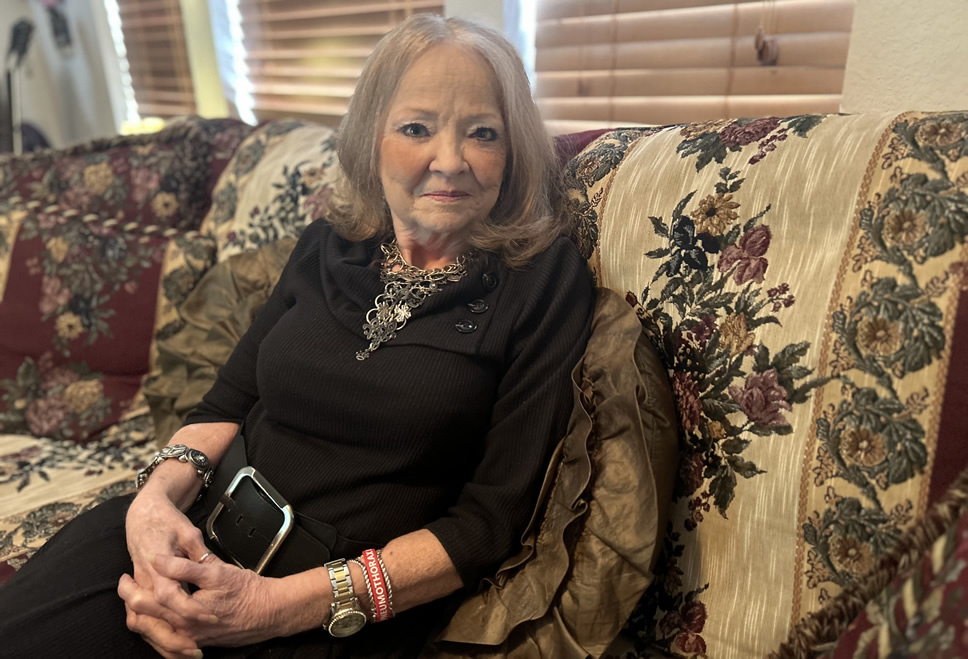FORT WORTH, Texas — For more than 20 years, an oxygen tank was Joyce Stovall’s unwanted companion.

Joyce Stovall
“I love kids, and I hated it when I’d see kids in the store and I’d say ‘Hi’ to them and they’d get this real scared look on their faces,” said Stovall, who was diagnosed in her 30s with asthma and emphysema.
Then she learned about an innovative, minimally invasive procedure used to treat patients with severe chronic obstructive pulmonary disease or emphysema. The procedure is performed at Texas Health Harris Methodist Hospital Fort Worth. Stovall, 62, now doesn’t need the familiar oxygen tube.
Dr. Sai Karan Vamsi Guda, D.O., an interventional pulmonologist on the medical staff at Texas Health Fort Worth, implanted endobronchial valves into Stovall’s diseased upper right lobe.
The one-way valves, about the size of a pencil eraser, allow trapped air in an overinflated lobe to be exhaled, shrinking the lobe and preventing further air blockage.
“It’s a miracle. Truly,” said Stovall, who lives in Mansfield. “I never thought I would ever be off oxygen.”
Joseph DeLeon, president of Texas Health Fort Worth, said innovation has been a hallmark of Texas Health Resources’ commitment to improve the health of the people in the communities it serves.
“Thanks to a talented medical staff skilled in the latest advancements in technology and our dedicated caregivers, many of our patients are finding relief and better outcomes, all without the need for surgery,” DeLeon said.
Safety first
Because the procedure carries risks, patients with emphysema are extensively tested to determine if they meet the criteria for this treatment. They cannot be a current smoker or vaper. Several tests are performed to evaluate whether a patient will tolerate the valve placement.
“The safety of the patient comes first,” Guda said.
The procedure does not involve any cutting or incisions. Rather, the valves are placed in the airways using a small camera called a bronchoscope, which is inserted into the lungs through the patient’s nose or mouth.
Normal lung function is greater than 70%. Stovall’s lung function prior to having the valves implanted was at only about 19%. Since the valve placements, it’s doubled to 39%.
Patients receiving the therapy see a 15% to 20% improvement in lung function capacity, on average, Guda said. More important are the benefits they’re seeing in their lives.
“For Mrs. Stovall, it meant being able to come off oxygen and walk a little distance. Now, she and her husband are looking at going dancing, which she could not even imagine doing 20 years ago,” Guda said. “I had a different patient that just wanted to stand up and take a shower without having to sit down, and now she is pulling weeds out of her backyard that she hadn’t tended to in years. I have another patient who needed a wheelchair to go to rehabilitation and now he’s on the treadmill walking.”
Stovall is most appreciative.
“People couldn’t hear me before, because my voice was so low, so I just didn’t talk that much. Now, I can talk and people can understand me. They’ll be like, ‘Joyce, I need to go’ and I’ll just keep talking,” Stovall said, laughing.
“Everything is better,” Stovall added. “It’s given me better a quality of life.”
Related News
About Texas Health Resources
Texas Health Resources is a faith-based, nonprofit health system that cares for more patients in North Texas than any other provider. With a service area that consists of 16 counties and more than 7 million people, the system is committed to providing quality, coordinated care through its Texas Health Physicians Group and 29 hospital locations under the banners of Texas Health Presbyterian, Texas Health Arlington Memorial, Texas Health Harris Methodist and Texas Health Huguley. Texas Health access points and services, ranging from acute-care hospitals and trauma centers to outpatient facilities and home health and preventive services, provide the full continuum of care for all stages of life. The system has more than 4,100 licensed hospital beds, 6,400 physicians with active staff privileges and more than 26,000 employees. For more information about Texas Health, call 1-877-THR-WELL, or visit www.TexasHealth.org.
